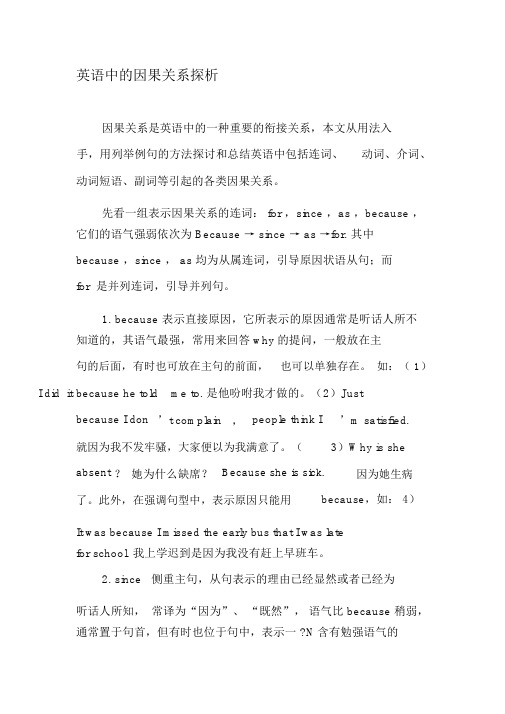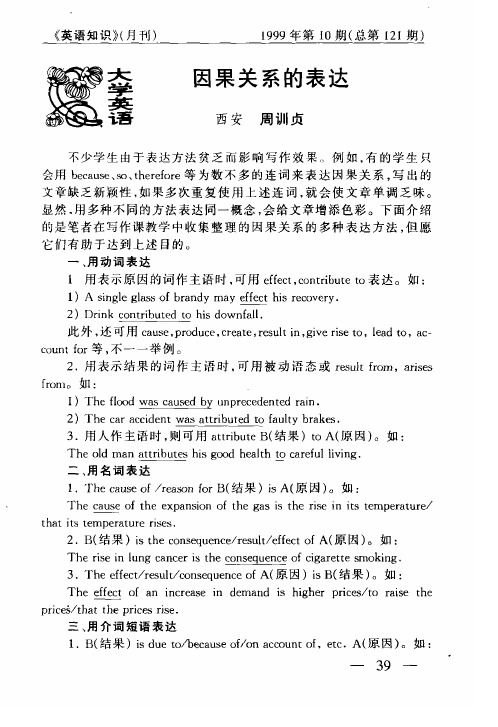英语因果关系表达法
- 格式:docx
- 大小:18.37 KB
- 文档页数:3

英语中的因果关系探析因果关系是英语中的一种重要的衔接关系,本文从用法入手,用列举例句的方法探讨和总结英语中包括连词、动词、介词、动词短语、副词等引起的各类因果关系。
先看一组表示因果关系的连词: for ,since ,as ,because ,它们的语气强弱依次为 Because → since → as →for. 其中because ,since , as 均为从属连词,引导原因状语从句;而for 是并列连词,引导并列句。
1.because 表示直接原因,它所表示的原因通常是听话人所不知道的,其语气最强,常用来回答 why 的提问,一般放在主句的后面,有时也可放在主句的前面,也可以单独存在。
如:( 1)I did it because he told me to. 是他吩咐我才做的。
(2)Justbecause I don’t complain,people think I’m satisfied.就因为我不发牢骚,大家便以为我满意了。
(3)Why is sheabsent?她为什么缺席?Because she is sick.因为她生病了。
此外,在强调句型中,表示原因只能用because,如: 4)It was because I missed the early bus that I was latefor school. 我上学迟到是因为我没有赶上早班车。
2.since 侧重主句,从句表示的理由已经显然或者已经为听话人所知,常译为“因为”、“既然”,语气比 because 稍弱,通常置于句首,但有时也位于句中,表示一 ?N含有勉强语气的原因。
如:( 5)Since he asks you,you’ll tell him why.他既然问你,你就告诉他为什么吧。
(6)Wethought that ,sincewe were in the area,we’d stop by and see them.我们想,既然到了这个地方,就该顺便去看看他们。

英语因果词因果关系是英语中常见的语言现象,表达原因和结果的词汇也非常常见。
常见的因果词包括:1. 因果连词因果连词可以用来连接两个句子,表示原因和结果之间的因果关系。
常见的因果连词有:- because:因为- so:所以- therefore:因此- thus:这样- consequently:因此- as a result:结果例如:- I didn't study hard, so I failed the exam. (我没有好好学习,所以考试不及格。
)- Because it was raining, we decided to stay indoors. (因为下雨了,我们决定呆在室内。
)2. 原因状语原因状语是在句子中表示原因的词或短语,可以放在句首或句中。
常见的原因状语有:- because of:因为- due to:由于- as a result of:由于- owing to:由于- on account of:由于例如:- Because of the bad weather, the flight was delayed. (由于天气不好,航班延误了。
)- Owing to his illness, he couldn't attend the meeting. (由于他生病了,他没能出席会议。
)3. 结果状语结果状语是在句子中表示结果的词或短语,可以放在句首或句中。
常见的结果状语有:- so:结果- therefore:因此- thus:这样- consequently:因此- as a result:结果例如:- He didn't study, so he failed the exam. (他没有学习,结果考试不及格了。
)- Tom lost his job, therefore he had to find a new one. (汤姆失业了,因此他必须找新工作。

因果关系英语因果关系在英语中通常表示为"cause and effect",其中"cause" 表示原因,"effect" 表示结果。
以下是一些常见的表示因果关系的英语短语和表达:1. Because of (由于) 例句:He couldn't attend the meeting because of his illness.2. Due to (由于) 例句:The delay was due to heavy traffic.3. As a result (结果是) 例句:She studied hard and, as a result, she passed the exam.4. Therefore (因此) 例句:The weather was bad, therefore we decided to stay inside.5. Thus (因此) 例句:She forgot her key, thus she had to wait for her roommate to arrive.6. Consequently (因此) 例句:The company experienced financial difficulties and consequently had to lay off some employees.7. Leads to (导致) 例句:Smoking often leads to health problems.8. Results in (导致) 例句:Not getting enough sleep can result in feeling tired and sluggish during the day.9. Causes (引起) 例句:Eating too much junk food causes weight gain.10. Triggers (触发) 例句:The sound of the alarm clock triggered her memory of a bad dream.1/ 1。

表因果的连词英语在英语中,表达因果关系的连词有很多,其中一些比较常见的包括:1. Because:表示原因,后面接句子。
例如:I couldn't go to the party because I had to work.2. Since:也表示原因,后面也接句子,但它更强调的是已知的事实或信息。
例如:Since you're already here, why don't we get started?3. As:介词或连词,表示原因或时间,后面接子句或短语。
例如:As he doesn't like chocolate, I bought him a vanilla cake instead.4. Therefore:表示因此、所以的意思,通常用于书面语或正式场合。
例如:The roads were closed; therefore, we had to takea different route.5. So:也表示因此、所以,但用法更口语化,可以用于正式和非正式场合。
例如:I'm tired, so I'm going to bed early tonight.6. Consequently:也表示因此、所以,语气较正式。
例如:The company lost money last quarter; consequently, they had to lay off some employees.7. Therefore:表示因此、所以,用于正式场合。
例如:The evidence suggests that the suspect is guilty; therefore, he will be charged with the crime.这些连词在句子中的位置和用法可以根据具体情境和语境来灵活运用。


as表作为的用法作为一个常见的介词,"as"在英语中有多种用法。
本文将重点介绍"as"作为连词时的用法和意义。
以下是"as"作为连词时的几种常见用法。
1. 表示因果关系当"as"用于表示因果关系时,相当于"because"或"since",引导原因状语从句。
例如:"As I was tired, I decided to go to bed early." (由于我很累,我决定早点睡觉。
)2. 表示时间关系"as"也可用于表达时间关系,引导时间状语从句,相当于"when"。
例如:"I received a phone call as I was leaving the office." (当我要离开办公室时,我接到了一个电话。
)3. 表示身份或职业在一些固定搭配中,"as"可以表示某人的身份或职业。
例如:"He works as a doctor in a local hospital." (他在一家地方医院做医生。
)4. 表示方式或性质"as"可以表示某事物的方式或性质,引导方式状语从句。
例如:"She moved as quietly as possible so as not to wake anyone up." (她尽可能地悄悄地移动,以免吵醒任何人。
)5. 表示比较"as"可用于表示比较关系,引导比较状语从句。
例如:"She is as tall as her sister." (她和她妹妹一样高。
)6. 表示让步有时候,"as"可以表示让步关系,相当于"although"或"though"。
初中英语知识点归纳原因状语从句原因状语从句是英语中的一个重要知识点,用于描述造成某种结果的原因。
它通常由一个引导词引导,如because、since、as,以及由why引导的特殊疑问句。
本文将对初中英语中常见的原因状语从句进行归纳和总结。
1. 因果关系因果关系是原因状语从句常用的一种表达方式。
例如:- I couldn't attend the party because I was busy with my homework.- Since it was raining heavily, we decided to stay at home.- They had to cancel the trip as the bus broke down.这些句子中的原因状语从句表达了导致某种结果的原因。
2. 原因和原因结果有时候,一个原因状语从句可以带来多个原因结果。
例如:- She missed the train because she overslept and there was heavy traffic.- He failed the exam as he didn't study hard and was sick on that day.这些句子中的原因状语从句使用了连词"because"或"as",并列列举了两个或更多的原因结果。
3. 引导词的用法在原因状语从句中,根据具体语境,可以使用不同的引导词。
例如:- Because he was tired, he fell asleep during the movie.- Since she loves animals, she wants to become a veterinarian.- I don't know why he left early.- She couldn't go to the party as she had to babysit her younger sister.这些句子中的引导词分别是"because"、"since"、"why"和"as",它们根据主句和从句之间的逻辑关系来选择使用。
英语表达因果关系的经典句型1. Because the duration of action of the toxin is limited, treatment of ten must be given about every three months. (因为此毒素的作用时期是有限的,每三个月必须治疗一次。
)2. Because of his incompetence, we lost a lot of business.(因为他的能力不足,我们失去很多生意。
)3. Just because I don't complain doesn't mean I'm satisfied.(就因为我不发怨言,并不表示我很满意。
)4. Since this research cannot be justified on the basis of its therapeutic benefit for the patient, it must be considered nontherapeutic.(由於此研究不能以治疗带来的利益来衡量,我们必须从治疗以外的角度来看此研究。
)5. The argument is fallacious, for it is based on a set of factual flaws.(这段论述是谬误的,因为它的基础与事实不符。
)6. As he has been in prison several times, he is a prime suspect for the case.(由於他坐过几次牢,他是此案件的主嫌犯。
)7. Now tha t these studies have provided us with more convenient, versatile antibiotic strategies for treating low-risk patients with fever and neutropenia, outpatient treatment of these diseases seem justified.(由於这些研究提供我们较方便、多用途的抗生素,以治疗患有发烧以及嗜中性白血球减少症的低危险群患者,那么以门诊方式处理这些疾病似乎就显得名正言顺。
英语因果关系表达法Company Document number:WUUT-WUUY-WBBGB-BWYTT-1982GT表示因果关系的英语表达法英语中表示因果关系的方式很多。
除原因状语从句之外,名词、介词、连接副词、主动词、并列连词和从属连词等也都可以用来表示逻辑上的因果关系。
一、名词表示逻辑上的因果关系常用的表示因果关系的名词有result,cause和 reason等。
例如:Ken's illness is the result of drinking heavily.肯生病的原因是酗酒。
What was the cause of the air crash导致那起空难的原因是什么二、介词表示逻辑上的因果关系从结构来看,介词分为简单介词和复杂介词。
简单介词通常由一个单词构成,而复杂介词通常由两个或两个以上的单词构成。
简单介词和复杂介词都可以用来表示因果关系。
1.简单介词常用的表示因果关系的简单介词有from,at, through和with等。
例如:He felt very powerless from lack of money.由于缺钱,他感到很无奈。
My mother always rejoices at my success.母亲总是为我的成功而欣喜。
2.复杂介词常用的表示因果关系的复杂介词有due to, because of, owing to, thanks to, as a result of, in consequence of, on account of和in view of等。
例如:Due to hard work, they won promotion由于工作努力,他们得到了晋升。
The football match was cancelled because of the heavy mist.这场足球比赛因大雾而被取消。
三、连接副词表示逻辑上的因果关系连接副词在分句之间起连接作用,充当连接性状语。
因果关系是英语语法中一个非常重要的部分,表示相互关联的事件或行为之间的逻辑连接。
在英语写作中,为了表达清晰的因果关系,因此需要掌握好because, so, so that等语法点。
下面我将从这三个语法点出发,结合实例进行详细解释。
一、because的用法1. because作为连词,用来引导表示原因的从句。
因为表示原因,所以常常放在主句之后。
例如:Our flight was delayed because of the bad weather.由于恶劣天气,我们的航班延误了。
2. because引导的从句可以放在句首也可以放在句尾,但是需要注意的是,当因果关系非常明显的时候,通常将原因放在句首,这样可以使句子更加生动。
例如:Because of the heavy rain, the match was postponed.由于暴雨,比赛被推迟了。
3. because也可以用于回答why的疑问句,表示原因。
例如:Why did you leave early?Because I had to catch a train.你为什么提前离开?因为我要赶火车。
4. 注意,because引导的从句不可单独作为句子使用,必须和主句搭配使用。
二、so的用法1. so作为连词,用来表示因果关系,引导结果状语从句。
所表示的结果通常是由于上文提到的原因而产生的。
例如:The road was icy, so I drove very slowly.路上结冰了,因此我开车很慢。
2. so可以用在主句之前或之后,但是如果是用在主句之后,通常需要在so后面加上逗号,以表示and的含义。
例如:The weather was terrible, so we decided to stay at home.天气太糟糕了,因此我们决定呆在家里。
3. so还可以用来回答前文提到的原因。
例如:Why did you leave early?The meeting finished early, so I left.为什么你提前离开?会议提前结束了,所以我离开了。
表示因果关系的英语表达法英语中表示因果关系的方式很多。
除原因状语从句之外,名词、介词、连接副词、主动词、并列连词和从属连词等也都可以用来表示逻辑上的因果关系。
一、名词表示逻辑上的因果关系常用的表示因果关系的名词有result,cause和reason等。
例如:Ken's illness is the result of drinking heavily.肯生病的原因是酗酒。
What was the cause of the air crash?导致那起空难的原因是什么?二、介词表示逻辑上的因果关系从结构来看,介词分为简单介词和复杂介词。
简单介词通常由一个单词构成,而复杂介词通常由两个或两个以上的单词构成。
简单介词和复杂介词都可以用来表示因果关系。
1.简单介词常用的表示因果关系的简单介词有from,at,through和with等。
例如:He felt very powerless from lack of money.由于缺钱,他感到很无奈。
My mother always rejoices at my success.母亲总是为我的成功而欣喜。
2.复杂介词常用的表示因果关系的复杂介词有due to, because of, owing to, thanks to, as a result of, in consequence of, on account of和in view of等。
例如:Due to hard work, they won promotion由于工作努力,他们得到了晋升。
The football match was cancelled because of the heavy mist.这场足球比赛因大雾而被取消。
三、连接副词表示逻辑上的因果关系连接副词在分句之间起连接作用,充当连接性状语。
常用的表示因果关系的连接副词有hence, therefore, thus, accordingly和consequently等。
例如:My mother is ill, hence I must go home now.因为妈妈病了,所以我现在必须回家。
It rained, therefore the game was put off.因为下雨,所以比赛延期举行。
四、主动词表示逻辑上的因果关系英语主动词分为单词动词和词组动词。
单词动词是指由一个单词构成的动词,而词组动词则是指由两个或两个以上的单词构成的动词。
单词动词和词组动词都可以用来表示逻辑上的因果关系。
1.单词动词常用的表示因果关系的单词动词有cause, make和impel等。
例如:The cold weather caused many animals to die.由于天气寒冷,许多动物都被冻死了。
Her death made him very sad.她的去世令他很难过。
2.词组动词常用的表示因果关系的词组动词有result in, stem from, bring about和lead to等。
例如: The talks resulted in destroying a lot of missiles.谈判的结果是许多导弹被销毁了。
Their discontent stemmed from low pay and poor working conditions.工资低和工作条件差是他们产生不满情绪的原因。
五、并列连词and表示逻辑上的因果关系有时,and连接的两个并列谓语可以表示逻辑上的因果关系:前一个谓语表示原因,后一个谓语说明结果。
例如:He drank too much and was ill.他喝了太多的酒,生病了。
He tried hard and passed the final examination successfully.由于学习努力,他顺利通过了期末考试。
六、从属连词表示因果关系从属连词分为简单从属连词、复杂从属连词、关联从属连词和边际从属连词。
这四类从属连词都可以用来引导原因状语从句。
1.简单从属连词简单从属连词即单词从属连词。
常用的表示因果关系的简单从属连词有because, as, since 和for等。
例如:Mary was scolded by her English teacher because she was late again.玛丽因为再次迟到而受到了英语老师的批评。
As she lacked money, she decided not to go to school again.因为缺钱,所以她决定不再上学了。
2.复杂从属连词复杂从属连词通常由两个或两个以上的单词构成。
常用的表示因果关系的复杂从属连词有in that, now that和in as much as等。
例如:I'm very sad now, in that my girlfriend left me.我现在很难过,因为女朋友离开了我。
Now that you've arrived, we can begin.既然你已经到了,我们可以开始了。
3.关联从属连词关联从属连词是指由两个关联词构成的从属连词。
常用的表示因果关系的关联从属连词有seeing(that)…therefore,和since(表示“理由”)… then/in that case等。
例如:Seeing(that)the weather is bad therefore we have to stay at home.因为天气不好,所以我们不得不呆在家里。
Since I don't complain then/in that case people think I'm satisfied.因为我没发牢骚,所以人们就以为我很满意。
4.边际从属连词边际从属连词是指实际上起着从属连词作用的某些结构。
常用的表示因果关系的边际从属连词有on the ground(s)that, by reason that和for fear (that)等。
例如:They look down on me on the grounds that I am very stupid.因为我很笨,所以他们看不起我。
I didn't attend the meeting by reason that I was ill.我因病没有参加那个会议。
七、非限定短语表示因果关系非限定短语包括不定式短语、-ing分词短语和-ed分词短语。
非限定短语能充当主语、主语补语、宾语、宾语补语和状语等多种成分。
作状语时,非限定短语可以表示逻辑上的因果关系。
1.不定式短语Mary seemed very surprised to meet me.玛丽碰见我好像很吃惊。
We were surprised to find her surrounded by five boys.看到她被五个男孩围在中间,我们感到很惊讶。
2.-ing分词短语Not knowing his address, we didn't go to his house yesterday.因为不知道地址,所以昨天我们没去他家。
Knowing English well, he talked to the foreigner without any difficulty.他英语很好,所以与那位外国人交谈没有任何困难。
3.-ed分词短语Machine used, they worked more efficiently机器的使用使他们的工作效率更高了。
Hit by a stone yesterday, he is in hospital now.他昨天被一块石头砸着了,所以现在正躺在医院里。
八、无动词短语表示因果关系一个主谓结构中如果没有任何形式的动词或动词词组作谓语,那么这个主谓结构就是无动词短语。
无动词短语可以作修饰性状语,具有多种功能,其中之一就是表示因果关系。
例如: Afraid of hurting his feelings, I didn't mention it.由于怕伤害他的感情,我没有提那件事。
Unable to find appropriate words to express myself, I left silendy.由于一时找不到合适的词语来表达,我悄悄地离开了。
九、定语从句表示因果关系有些从句从语法结构上看是定语从句,但从语义上看却兼有原因状语从句的功能。
例如: I don't like that city, which is too noisy.我不喜欢那个城市,因为它太嘈杂了。
Man can't live On the moon, where there is no water or air.人类不能在月球上居住,因为那里既没有水,又没有空气。
十、特定的句子结构表示因果关系1.“..., it is that...”结构表示因果关系在“..., it is that...”结构中,逗号前的从句提出假设,逗号后的主句则对提出的假设或加以说明,或给出原因。
例如:If I scold you, it is that I love you.我骂你,是因为我爱你。
If he doesn't go, it is that the weather is too terrible.如果他没去,那是因为天气太糟糕了。
2.“not that..., but that...”结构表示因果关系“not that.., but that...”结构的意思是“不是因为……,而是因为……”,其中的that相当于because。
例如:Not that I want to learn, but that I don't have the heart to make them disappointed.不是因为我想学习,而是因为我不忍心让他们失望。
Not that I was afraid of him, but that I had no choice.不是因为我怕他,而是因为我别无选择。
3.“be+adj.+that...”结构表示因果关系“be+adj.+that...”结构也常用来表示因果关系,其中的形容词一般是glad, sorry, annoyed, disappointed, surprised, ashamed和delighted等。
例如:I'm glad that he's feeling better.我很高兴他感觉好点了。
I'm awfully sorry that this has occurred.发生了这件事情,我感到非常抱歉。